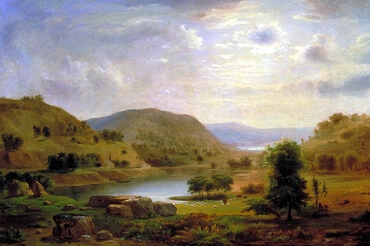1
Därefter förde han mig tillbaka till husets ingång, och där fick jag se vatten rinna fram under husets tröskel på östra sidan, ty husets framsida låg mot öster; och vattnet flöt ned under husets södra sidovägg, söder om altaret.
2
Sedan lät han mig gå ut genom norra porten och förde mig omkring på en yttre väg till den yttre porten, den som vette åt öster. Där fick jag se vatten välla fram på södra sidan.
3
Sedan gick mannen, med ett mätsnöre i handen, ett stycke mot öster och mätte därvid upp tusen alnar och lät mig så gå över vattnet, och vattnet räckte mig där till fotknölarna.
4
Åter mätte han upp tusen alnar och lät mig så gå över vattnet, och vattnet räckte mig där till knäna. Åter mätte han upp tusen alnar och lät mig så gå över vattnet, som där räckte mig upp till länderna.
5
Ännu en gång mätte han upp tusen alnar, och nu var det en ström som jag icke kunde gå över. Ty vattnet gick så högt att man måste simma; det var en ström som man icke kunde gå över.
6
Och han sade till mig: »Nu har du ju sett det, du människobarn?» Sedan förde han mig tillbaka upp på strömmens strand.
7
Och när han hade fört mig dit tillbaka, fick jag se träd i stor myckenhet stå på strömmens strand, på båda sidor.
8
Och han sade till mig: »Detta vatten rinner fram mot Östra kretsen och flyter ned på Hedmarken och faller därefter ut i havet. Vattnet som fick bryta fram går alltså till havet, och så bliver vattnet där sunt.
9
Och överallt dit den dubbla strömmen kommer, där upplivas alla levande varelser som röra sig i stim, och fiskarna bliva där mycket talrika; ty när detta vatten kommer dit, bliver havsvattnet sunt, och allt får liv, där strömmen kommer.
10
Och fiskare skola stå utmed den från En-Gedi ända till En-Eglaim, och såsom ett enda fiskeläge skall den sträckan vara. Där skola finnas fiskar av olika slag i stor myckenhet, alldeles såsom i Stora havet.
11
Men gölar och dammar där skola icke bliva sunda, utan skola tjäna till saltberedning.
12
Och vid strömmen, på dess båda stränder, skola allahanda fruktträd växa upp, vilkas löv icke skola vissna, och vilkas frukt icke skall taga slut, utan var månad skola träden bara ny frukt, ty deras vatten kommer från helgedomen. Och deras frukter skola tjäna till föda och deras löv till läkedom.»
13
Så säger Herren, HERREN: Dessa äro de gränser efter vilka I skolen utskifta landet såsom arvedel åt Israels tolv stammar (varvid Josef får mer än en lott).
14
I skolen få det till arvedel, den ene såväl som den andre, därför att jag med upplyft hand har lovat att giva det åt edra fader; så skall nu detta land tillfalla eder såsom arvsegendom.
15
Detta skall vara landets gräns på norra sidan: från Stora havet längs Hetlonsvägen, dit fram där vägen går till Sedad,
16
Hamat, Berota, Sibraim, som ligger mellan Damaskus' och Hamat områden, det mellersta Haser, som ligger invid Haurans område.
17
Så skall gränsen gå från havet till Hasar-Enon vid Damaskus' område och vidare allt längre norrut och upp mot Hamats område. Detta är norra sidan.
18
Och på östra sidan skall gränsen begynna mellan Hauran och Damaskus och gå mellan Gilead och Israels land och utgöras av Jordan; från nordgränsen nedåt, utmed Östra havet, skolen I mäta ut den. Detta är östra sidan.
19
Och på sydsidan, söderut, skall gränsen gå från Tamar till Meribots vatten vid Kades, till bäcken, fram till Stora havet. Detta är sydsidan, söderut.
20
Och på västra sidan skall gränsen utgöras av Stora havet och gå från sydgränsen till en punkt mitt emot det ställe där vägen går till Hamat. Detta är västra sidan.
21
Och I skolen utskifta detta land åt eder efter Israels stammar.
22
I skolen utdela det genom lottkastning till arvedel åt eder själva och åt främlingarna som bo ibland eder och hava fött barn ibland eder. Ty de skola av eder hållas lika med infödda israeliter; de skola tillfalla eder såsom en arvedel bland Israels stammar.
23
I den stam där främlingen bor, där skolen I giva honom hans arvedel, säger Herren, HERREN.







